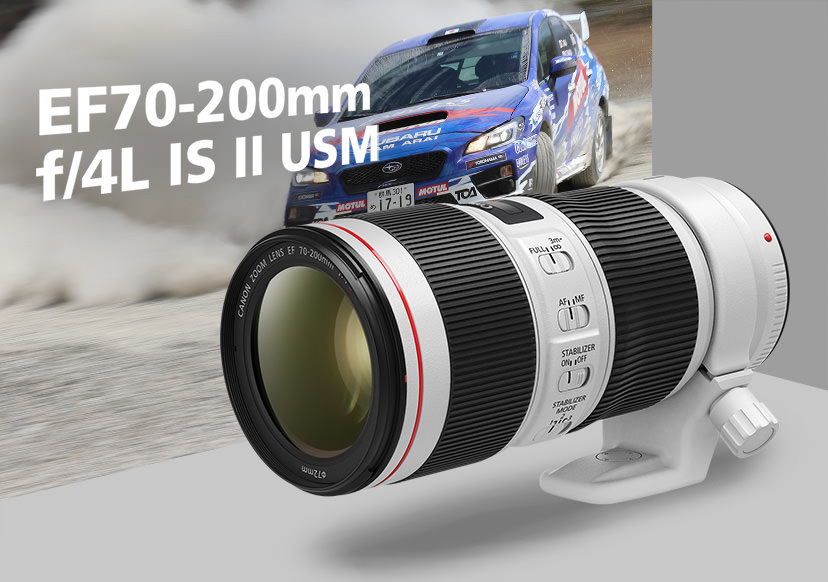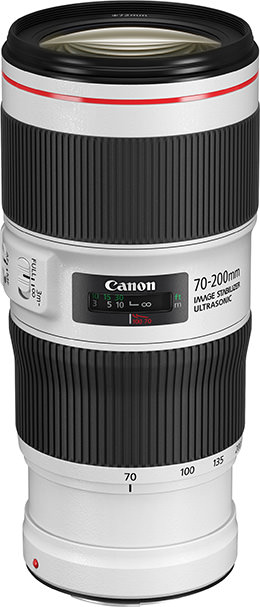On 7 June 2018, Canon announced the EF70-200mm f/4L IS II USM. Compact and lightweight like its popular predecessor, this telephoto zoom lens features improved image quality and enhanced in-lens image stabilisation of up to approximately 5 stops. (Reported by: Makoto Suzuki (Digital Camera Watch))

Image stabilisation even while panning with up to 5 stops of IS
An improved version of the EF70-200mm f/4L IS USM (released in 2006), the EF70-200mm f/4L IS II USM is the latest addition to Canon’s premium L-lens lineup. It joins the latter’s collection of f/4 lenses, which were developed to provide compact, lightweight lens options to photographers seeking mobility in addition to high image quality.

With its 5-stop image stabilisation, improved from its predecessor’s 3 stops, the new lens boasts the most powerful in-lens image stabilisation (IS) in the entire EF lens lineup. It also supports IS Mode 3 and the ‘Panning’ Special Scene (SCN) mode.
*Cameras compatible with the ‘Panning’ Special Scene Mode as at June 2018: EOS 6D Mark II, EOS M5, EOS M6, EOS M50.

Shot with the Panning mode. When this mode is selected during Live View shooting, the camera automatically sets the optimum shutter speed, and the IS system stabilises subject blur.
You may be interested in:
Lens FAQ #3: How are Image Stabilization Stops Determined?
Optical design: Reduced flare and ghosting, easier maintainability
While the EF70-200mm f/4L IS II USM generally retains the same optical configuration as its predecessor, improvements have been made to provide better image quality and easier maintainability. These include:
- Improvements to the lens coatings for better reduction of flare and ghosting
- Changes to the shape of some lens elements
- Optimised placement of elements
- Fluorine coating on the first and last lens element surfaces, which allows dirt to be wiped off easily
Significant flare reduction
EF70-200mm f/4L IS USM (Predecessor)

EF70-200mm f/4L IS II USM

These images were shot under the same conditions. Lens flare is greatly reduced in the image shot by the newer EF70-200mm f/4L IS II USM.
Lens construction diagram

A: Fluorite lens element
B: UD lens element
Just like its predecessor, the EF70-200mm f/4L IS II USM contains 1 fluorite lens and 2 UD lens elements. The shapes of the lens elements have been changed and their position in the layout optimised. The improvements to the coatings are said to have improved image quality.
Shorter closest focusing distance, increased maximum magnification
With a shorter minimum shooting distance (closest focusing distance) of 1m, users can now photograph subjects at closer range. Maximum magnification has also been improved to 0.27x.
EF70-200mm f/4L IS USM (Predecessor)

EF70-200mm f/4L IS II USM

Being able to shoot subjects at closer range not only allows users to fill more of their frame with the subject, but also makes it easier to achieve creamy background bokeh.
Key specifications and other details

The EF70-200mm f/4L IS II USM also features:
- Filter diameter: 72mm
- 9 aperture blades
- Maximum diameter × total length: Φ80mm × 176mm
- Approximate weight: 780g.
It will be sold alongside the existing EF70-200mm f/4L USM.
Also see:
Canon Unveils the EF70-200mm f/2.8L IS III USM
What is the difference between an f/2.8 and an f/4 telephoto zoom lens?
Receive the latest update on photography news, tips and tricks.
Be part of the SNAPSHOT Community.
Sign Up Now!
About the Author
Delivers daily news related to topics such as digital cameras and peripheral devices, and imaging software. Also publishes articles such as reviews on the use of actual digital camera models and photo samples taken using new models.


































